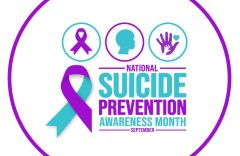By: Andrea Costanzo, Quality Data Coordinator
In a world where mental health is becoming an increasingly recognized priority, discussions around suicide remain one of the most critical yet frequently overlooked topics. Every year, millions of people are affected by suicide, either through personal experiences or the loss of loved ones. This blog aims to shed light on suicide awareness, its signs, the importance of open conversations, and how we can support those in need.
Understanding Suicide
Suicide is a complex issue influenced by a variety of factors, including mental health disorders, trauma, societal pressures, and personal circumstances. According to the World Health Organization (WHO), close to 800,000 people die by suicide each year, making it a leading cause of death globally. Yet, despite its prevalence, the stigma surrounding mental health and suicide often prevents open discussions, leading to isolation for those who may be struggling.
Recognizing the Signs
Understanding the warning signs of suicidal thoughts can be crucial in offering support to those in need. Some common indicators include:
- Talking About Suicide: This can include direct statements about wanting to die or feeling hopeless, as well as indirect comments about being a burden to others.
- Withdrawal: Individuals may begin to isolate themselves from friends, family, and activities they once enjoyed.
- Mood Changes: Sudden changes in mood, such as increased irritability, sadness, or a sense of calm after a period of depression, can be warning signs.
- Changes in Behavior: Engaging in risky behaviors, neglecting personal hygiene, or expressing feelings of hopelessness can indicate a crisis.
- Substance Abuse: Increased use of drugs or alcohol may be a sign of underlying mental health issues.
If you observe any of these signs in someone you care about, it’s crucial to approach the situation with compassion and concern.
How We Can Help
- Educate Yourself and Others: Understanding mental health and the factors contributing to suicide can help dismantle misconceptions and promote empathy.
- Ask Questions: If you suspect someone is struggling, ask them about their feelings. It’s okay to talk about suicide; sometimes, just bringing it up can lift the burden they feel.
- Listen Actively: Offer a listening ear without trying to fix the problem immediately. Sometimes, what people need most is someone who will listen.
- Encourage Professional Help: If someone is in crisis, encourage them to seek professional assistance. Offer to help them make an appointment with a mental health professional.
- 988 Suicide & Crisis Lifeline
- The 988 Lifeline provides 24/7, free, and confidential support for people in distress and serves as a resource for you and your loved ones. Dial#988